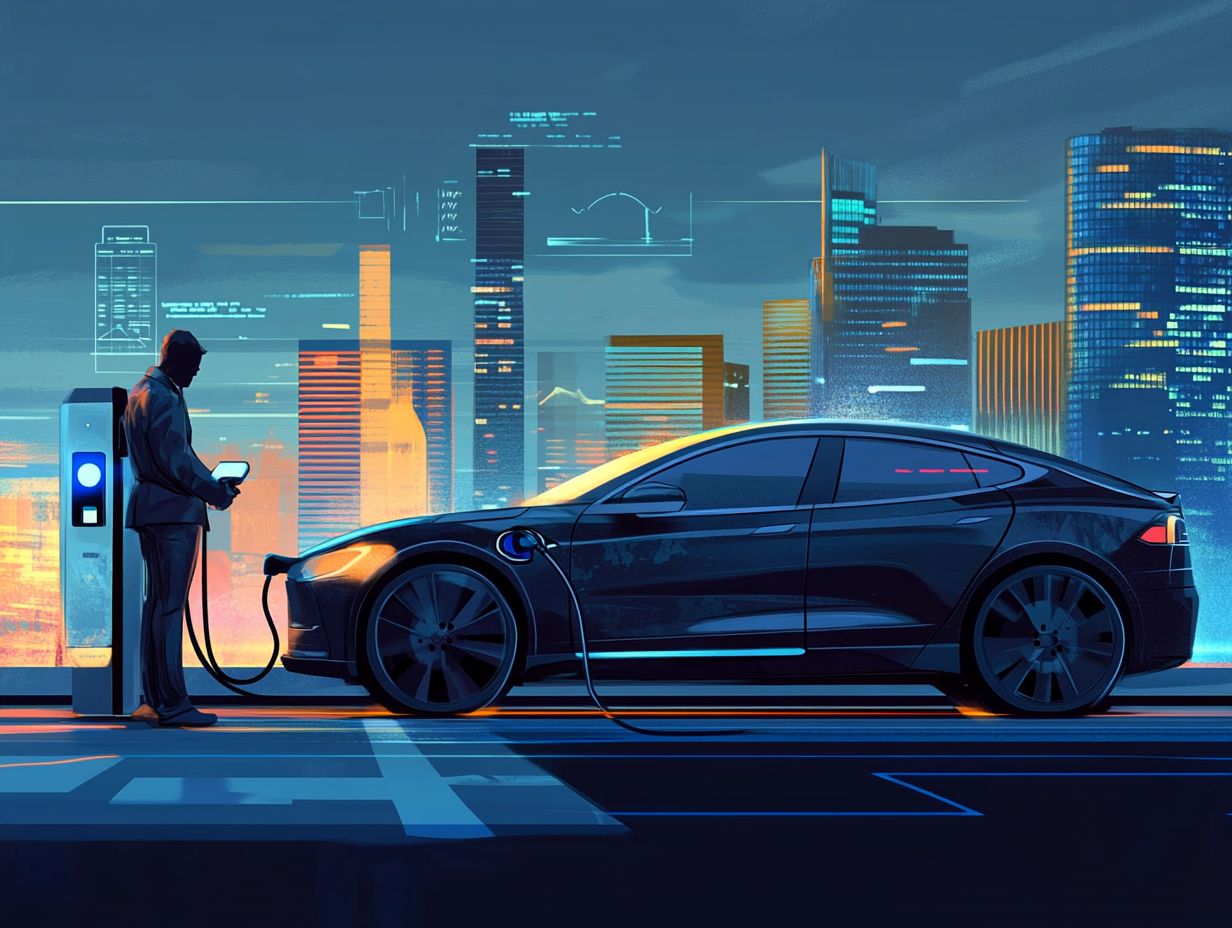Understanding Coverage for Electric Vehicles
Imagine driving a car that s good for the planet that s the promise of electric vehicles! Electric vehicles (EVs) are revolutionizing your perspective on transportation, yet insuring them presents its own unique challenges and considerations.
This article will guide you through the various types of coverage available for EVs, including liability, collision, and comprehensive options.
Key factors influencing your insurance include how long the battery lasts and the accessibility of charging stations, alongside a careful evaluation of costs versus potential savings and incentives.
You ll find valuable tips that will assist you in selecting the right coverage tailored specifically to your needs. Get ready to discover how to insure your electric ride!
Contents
- Key Takeaways:
- Types of Coverage for Electric Vehicles
- Factors Affecting Coverage for Electric Vehicles
- Costs and Benefits of Insuring an Electric Vehicle
- Tips for Choosing the Right Coverage
- Frequently Asked Questions
- What is meant by ‘coverage’ for electric vehicles?
- What types of coverage should I consider for my electric vehicle?
- Do electric vehicles have different coverage requirements than traditional vehicles?
- Are there any discounts or incentives for coverage on electric vehicles?
- Does coverage for electric vehicles include charging equipment?
- What should I do if my electric vehicle is involved in an accident?
Key Takeaways:

- Electric vehicles require specialized coverage including liability, collision, and comprehensive coverage.
- The cost and availability of charging stations, battery life, and replacement costs can affect insurance coverage for EVs.
- When choosing coverage for an EV, consider the specific needs and features of your vehicle to ensure the right coverage at the best price.
What are Electric Vehicles?
Electric vehicles (EVs) represent a groundbreaking shift in automotive technology, harnessing electric power instead of conventional fuels. This transition offers you eco-friendly transportation solutions with significantly lower emissions.
Models like the Tesla Model 3 not only help reduce dependency on fossil fuels but also contribute to energy independence, making them an increasingly attractive choice for consumers who prioritize environmental responsibility.
The importance of EVs extends far beyond personal convenience. As cities grapple with air pollution and climate change, your choice to adopt an EV can create a profound positive impact on urban environments.
Today s market showcases a remarkable variety of electric vehicles, ranging from fully electric models to hybrids that blend internal combustion engines with electric motors, catering to your diverse needs and driving habits.
For those seeking flexibility, plug-in hybrids like the Chevrolet Volt allow you to utilize both electric and gasoline power, making the transition smoother.
With the ongoing development of charging infrastructure and innovations in battery technology, electric vehicles are poised to enhance efficiency and become pivotal players in the quest for a sustainable future.
Types of Coverage for Electric Vehicles
When insuring electric vehicles, you’ll find a range of coverage options designed to meet the distinct needs of electric car owners. For instance, understanding comprehensive coverage for electric cars ensures you have full protection against the unique risks and liabilities that can vary significantly from those associated with conventional vehicles.
It s crucial for you to understand the various insurance policies available such as liability, collision, and comprehensive coverage to make informed choices in today’s dynamic insurance landscape.
Liability Coverage
Liability coverage is a cornerstone of your insurance policy for electric vehicles, designed to protect you from financial fallout resulting from accidents that may injure others or damage their property while you’re out on the road.
This coverage is particularly vital for EV owners like you, who may encounter distinct risks stemming from the ongoing evolution in perceptions of coverage for unconventional vehicles, including EV safety and technology on our highways.
For example, a report from the Insurance Institute for Highway Safety highlights that while EVs tend to be involved in fewer accidents, it’s still essential for you to be prepared for potential liabilities.
Typically, annual premiums for EV liability coverage fall between $1,200 and $1,500, influenced by factors such as your driving history and location.
Interestingly, many insurance companies recognize the benefits of electric vehicles and offer discounts ranging from 10% to 20% for their owners, acknowledging both the reduced environmental impact and the lower risk associated with these models.
Securing adequate liability coverage becomes not only a protective measure but also a financially astute move for anyone investing in electric mobility.
Collision Coverage
Collision coverage is specifically tailored to protect your electric vehicle, such as a Tesla Model 3, from damage resulting from accidents with other vehicles or objects. To ensure you’re fully informed, consider understanding coverage for non-standard vehicles. This coverage can save you money on costly repairs!
As electric vehicles often come with higher repair costs, understanding coverage for specialty vehicles is essential. The parts and labor for electric vehicles are frequently more expensive than those for traditional cars. The complexity of electric vehicle systems requires specialized repairs, further emphasizing the importance of having a robust collision policy.
It’s vital to understand how this coverage interacts with your overall insurance premiums. Your premiums might increase based on factors like your vehicle s safety rating, the accident frequency in your area, and your personal driving history. All these elements shape the total cost of your insurance, highlighting the need for informed decision-making as an electric vehicle owner.
Comprehensive Coverage

Comprehensive coverage is an optional insurance policy that shields electric vehicle owners from a variety of non-collision-related risks, including theft, vandalism, and natural disasters. It offers peace of mind and financial security against unforeseen events.
This coverage becomes especially crucial when you face costly repairs from incidents like hail damage or flooding. Without sufficient protection, the financial strain of repairing or replacing your electric vehicle can be daunting, given the unique technologies and parts these vehicles require. Understanding what is coverage for electric motorcycles can help you make informed decisions about your insurance needs.
Insurance companies provide different comprehensive coverage options, affecting how much you ultimately pay out-of-pocket for repairs. By comparing policies, you can identify the best protection tailored to your needs, ensuring you re safeguarded from significant expenses that unexpected incidents might bring.
Factors Affecting Coverage for Electric Vehicles
Several crucial factors influence the insurance coverage options and rates for electric vehicles. Insurance providers assess various elements, including battery life, driving habits, and the rules that insurance companies use to assess risk, to determine the most suitable premiums for owners like you.
Understanding these factors can enable you to make informed decisions about your coverage.
Battery Life and Replacement Costs
Battery life plays a crucial role in the insurance landscape for electric vehicles, as insurers evaluate replacement costs and longevity when crafting policies for electric car owners.
On average, electric vehicle batteries last between 8 to 15 years, depending on your usage and maintenance. This lifespan can significantly impact your insurance premiums. Replacing a battery can cost anywhere from $5,000 to $15,000, or even more for high-end models. Policies are often tailored to address this potential expense, with some providers offering specialized coverage that considers battery depreciation over time.
By understanding these insights, you can navigate your insurance options with greater confidence and see how battery life directly affects your financial responsibilities in the event of damage or replacement.
Availability of Charging Stations
The availability of charging stations is crucial for electric vehicle insurance. A robust charging infrastructure enhances the appeal of owning an electric car and may lead to potential discounts on your insurance policy.
When you have easy access to numerous charging locations, the perceived risk of breakdowns or being stranded diminishes significantly. Insurers take such factors into account when crafting their pricing models, meaning you could discover lower premiums if you can show consistent access to charging stations.
You might also benefit from additional perks like reduced deductibles or rewards programs, providing further motivation to embrace electric vehicles. The relationship between charging infrastructure and insurance offerings is set to evolve as more consumers switch to this eco-friendly option.
Explore your insurance options today to find the best coverage for your electric vehicle!
Costs and Benefits of Insuring an Electric Vehicle
Insuring an electric vehicle involves costs and benefits that you, as a prospective owner, should consider carefully. Insurance premiums are the amounts you pay regularly for your insurance and can vary for electric vehicles compared to traditional cars.
Look for savings opportunities to help reduce your costs, like unique discounts available to eco-conscious drivers. These can significantly impact your overall expenses.
Comparing Insurance Premiums

When you compare insurance premiums for electric vehicles, consider several key factors. These include the specific insurance coverage available and average repair costs.
How different providers calculate their quotes is also important. Taking the time to compare quotes can unlock amazing savings and ensure you get the best deal!
It s crucial to evaluate multiple insurance quotes, as premiums can vary widely based on factors like the vehicle’s make and model, your driving history, and your geographic location.
Look for insurers who understand the unique characteristics of electric vehicles, such as advanced technology like battery management systems and potentially higher repair costs. By gathering and comparing quotes, you can find discounts specifically for electric vehicles and available incentives to reduce your overall costs.
This will help you navigate the insurance landscape with confidence and clarity.
Potential Savings and Incentives
As an electric vehicle owner, you’ll benefit from various potential savings and incentives, including tax credits and specific insurance discounts. These initiatives encourage the transition to eco-friendly transportation and help you manage costs.
Such incentives can significantly influence both the purchase price and the long-term expenses linked to owning an electric vehicle. Programs like the California Clean Vehicle Rebate Project provide financial assistance to buyers.
Federal tax credits can provide a significant return on your annual taxes. Many insurance companies also recognize the reduced risk associated with electric vehicles and offer discounted rates for owners.
This sweetens the deal and amplifies the financial benefits of choosing greener alternatives. Collectively, these savings opportunities not only ease your initial financial commitment but also foster ongoing savings throughout the life of your vehicle.
Don’t miss out on these great opportunities!
Tips for Choosing the Right Coverage
Choosing the ideal insurance coverage for your electric vehicle requires thoughtful consideration of various personal rating factors. Keep in mind your driving record and the specific insurance policies tailored for electric car owners.
Considerations for Your Specific Vehicle and Needs
When exploring insurance options, electric vehicle owners should consider their vehicle’s unique attributes, such as safety scores, along with their individual driving habits.
This careful consideration is vital, as the distinct characteristics of electric vehicles can greatly affect both insurance coverage and pricing.
If your vehicle has advanced safety features, you may qualify for discounts due to its lower risk on the road. Your driving patterns like how often you drive and your annual mileage also play a crucial role in determining your premiums.
Insurers often reward safe driving habits with lower rates, making this an important factor in your decision.
By aligning your insurance coverage with your vehicle’s innovative technology and your personal lifestyle, you can ensure you are well-protected while maximizing your potential savings.
Frequently Asked Questions
What is meant by ‘coverage’ for electric vehicles?

Coverage for electric vehicles refers to the protection or insurance provided to owners. This understanding coverage for electric vehicles can include various types of insurance, such as liability, collision, and comprehensive, to protect against potential risks and losses.
What types of coverage should I consider for my electric vehicle?
Just like traditional vehicles, it’s essential to have liability coverage. This protects you against damage or injuries caused to others while driving your electric vehicle.
You should also consider collision coverage, which protects your own vehicle from damage. Additionally, comprehensive coverage protects against events like theft or vandalism.
Do electric vehicles have different coverage requirements than traditional vehicles?
There might be minor differences in coverage requirements for electric vehicles, but overall, understanding coverage for electric utility vehicles reveals that the coverage needs are similar.
Don’t forget to check with your insurance provider to ensure your policy covers your specific electric vehicle model, including coverage for electric scooters.
Are there any discounts or incentives for coverage on electric vehicles?
Some insurance companies offer discounts or incentives for electric vehicle coverage. For instance, you may qualify for a discount if you drive fewer miles each year, which is often the case with electric vehicles.
It’s always a good idea to shop around and compare different insurance providers to find the best coverage and rates for your electric vehicle.
Does coverage for electric vehicles include charging equipment?
Typically, coverage for electric commercial vehicles does not include charging equipment. However, some insurance companies may offer additional coverage for charging equipment as an add-on to your policy.
Be sure to discuss this with your insurance provider to determine the best coverage for your specific needs.
What should I do if my electric vehicle is involved in an accident?
If your electric vehicle is in an accident, follow the same steps as with any vehicle. Exchange insurance information with the other party, take photos of the damage, and contact your insurance provider to file a claim.
It’s crucial to act quickly. Seek medical attention if needed and gather any witness statements or police reports.
Explore your options for electric vehicle insurance today! Contact your provider for more information.





